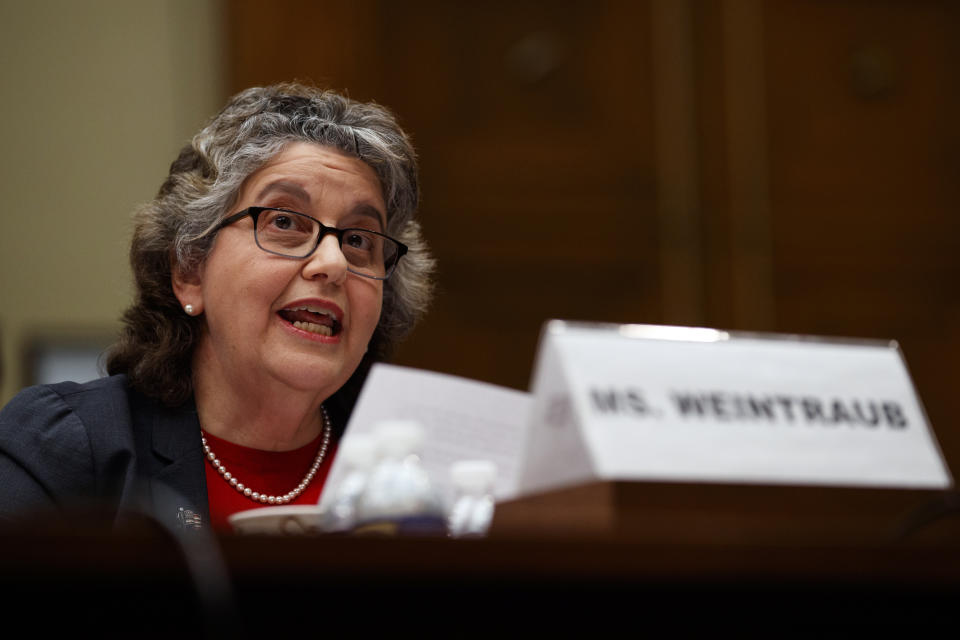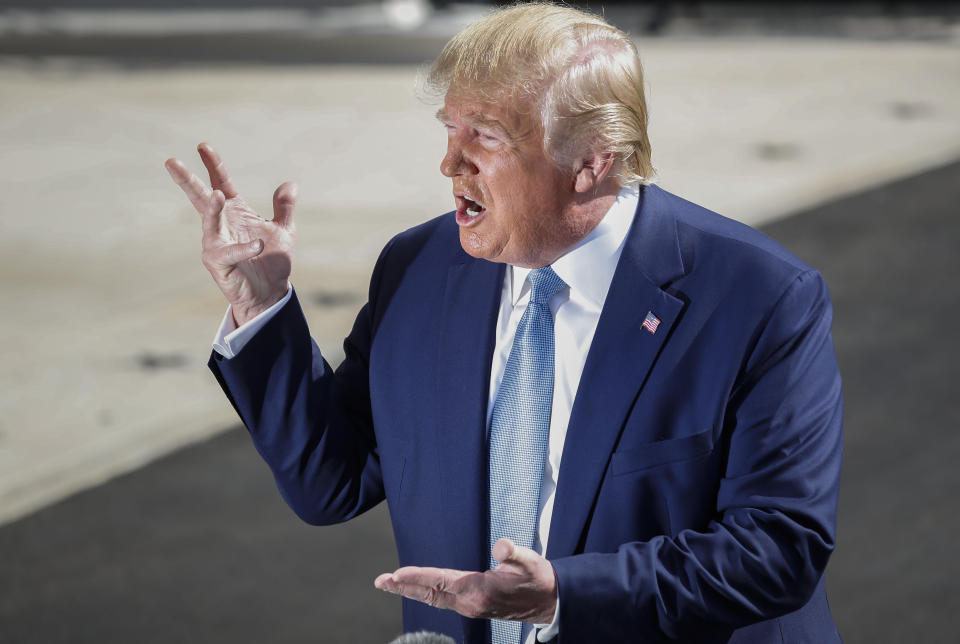Trump thinks it's fine to sic Ukraine and China on Biden. Here are some of the problems with that.
President Trump asserted Friday that he had “a right to go to a foreign country” to seek an investigation into allegations of corruption.
“If we feel that there’s corruption, like I feel like there was in the 2016 campaign — there was tremendous corruption against me — if we feel there’s corruption, we have a right to go to a foreign country,” Trump told reporters gathered on the South Lawn.
What the president did not mention was that the allegations involving former Vice President Joe Biden and his son Hunter — which have been raised almost exclusively by Trump himself, his lawyer Rudy Giuliani and a handful of right-wing conspiracy theorists — were directed against the man who is the leading candidate for the Democratic nomination to run against him in 2020.
This raises two interrelated issues. One is that, on the face of it, Trump was asking two foreign governments, Ukraine and China, for what would amount to help in his reelection campaign. The Federal Election Campaign Act of 1971, which was signed into law the following year by then-President Richard Nixon, prohibits foreign nationals from contributing “anything of value” to a federal election campaign or candidate. But Federal Election Commission Chair Ellen Weintraub told Yahoo News that the principle of keeping elections free of foreign influence goes back much further.
“This really goes back to the founding principles of our nation,” Weintraub said Friday in a telephone interview. “The Founding Fathers talked about foreign interference in our domestic affairs. George Washington wrote about it. Thomas Jefferson wrote about it. This is a long-standing concern in the United States.”
On Thursday, Weintraub appeared to refer to Trump’s public request that the two governments investigate Biden when she posted on Twitter a summary of the law on foreign election influence. But on Friday, she declined to speak to the specifics of efforts to enlist foreign assistance, instead limiting her remarks to the statute.

“When the FEC has looked at what are things of value, sometimes it is hard to put a precise dollar value on something, but that doesn’t mean that it has no value,” Weintraub said. “We have valued mailing lists, polling data, opposition research, intangible items that are still things of value even though they don’t come with a particular price tag on them. The point is that the ban is on anything of value from a foreign source.”
Brendan Fischer, a director at the nonpartisan election watchdog group Campaign Legal Center, said it was clear that Trump was seeking a political boost by asking China and Ukraine to investigate his political rival.
“There should be no real doubt that a foreign government investigation into President Trump’s 2020 political rival would be of value to him as a candidate,” Fischer told Yahoo News. “We may not be able to put a precise value on that investigation. It should be obvious that such an investigation would be of value to President Trump’s campaign and hurt Joe Biden’s.”
The FEC does punish individuals and campaigns for civil violations of campaign finance law, sometimes issuing fines. Criminal violations fall to the Justice Department, but in the Ukraine matter Attorney General William Barr himself was involved, making the prospect of prosecution extremely remote at best.
“For a campaign finance violation to be criminal it has to be knowing and willful, which I think was established, as the call was made one day after Robert Mueller testified on Capitol Hill and reaffirmed that it is illegal to solicit anything of value from a foreign national,” Fischer said. “President Trump knew what the law was and made this request anyway.”
Apart from the question of election law violations, the spectacle of the president publicly soliciting foreign governments — whose justice systems, to put it politely, don’t always measure up to America’s — to investigate and potentially prosecute a U.S. citizen, let alone a former vice president, appalled even some prominent Republicans.

Well, two of them, at least: Sen. Mitt Romney, R-Utah, said on Twitter that “the President’s brazen and unprecedented appeal to China and to Ukraine to investigate Joe Biden is wrong and appalling.” And Sen. Ben Sasse, R-Neb., said in a written statement to the Omaha World-Herald: “Americans don’t look to Chinese commies for the truth. If the Biden kid broke laws by selling his name to Beijing, that’s a matter for American courts, not communist tyrants running torture camps.”
Hypothetically, if Joe Biden were accused of a crime, would he be extradited for trial in China? Would the prosecutors offer leniency in exchange for his turning over information he possesses as a two-term vice president?
The implications of Trump’s remarks were so incendiary that another of his key defenders, Sen. Marco Rubio, R-Fla., took refuge in the fairly desperate suggestion that the words coming out of Trump’s mouth should not be taken literally when it came to seeking foreign investigations of his political rival.
“I don’t know if that’s a real request or him just needling the press knowing that you guys are going to get outraged by it,” Rubio told reporters Friday.
While Rubio may discount Trump’s remarks, it’s unclear how China views them. After bringing up Biden and Sen. Elizabeth Warren in a June 18 call with Chinese President Xi Jinping, Trump is reported to have promised to steer clear of publicly mentioning the ongoing Hong Kong protests, CNN reported. Trump administration officials also floated the possibility of a White House meeting with the Ukrainian president in exchange for a criminal probe of Biden, the Wall Street Journal reported.
For Fischer, and for many House Democrats, Trump’s apparent violation of campaign finance law is just the tip of the iceberg.
“The question of whether this violated campaign finance law is somewhat secondary to the bigger issue of the president abusing his power, especially given the information that has come out over the past few days about the conversations that U.S. officials had with Ukrainian officials in advance of the [July 25] phone call,” Fischer said. “This was a much broader effort and President Trump here was using the power of his office and the implied threat of withholding foreign assistance for his personal political gain, and that is incredibly concerning regardless of whether the foreign national ban was on the books.”
_____
Download the Yahoo News app to customize your experience.
Read more from Yahoo News:



